by Mike Jordan / The Guardian
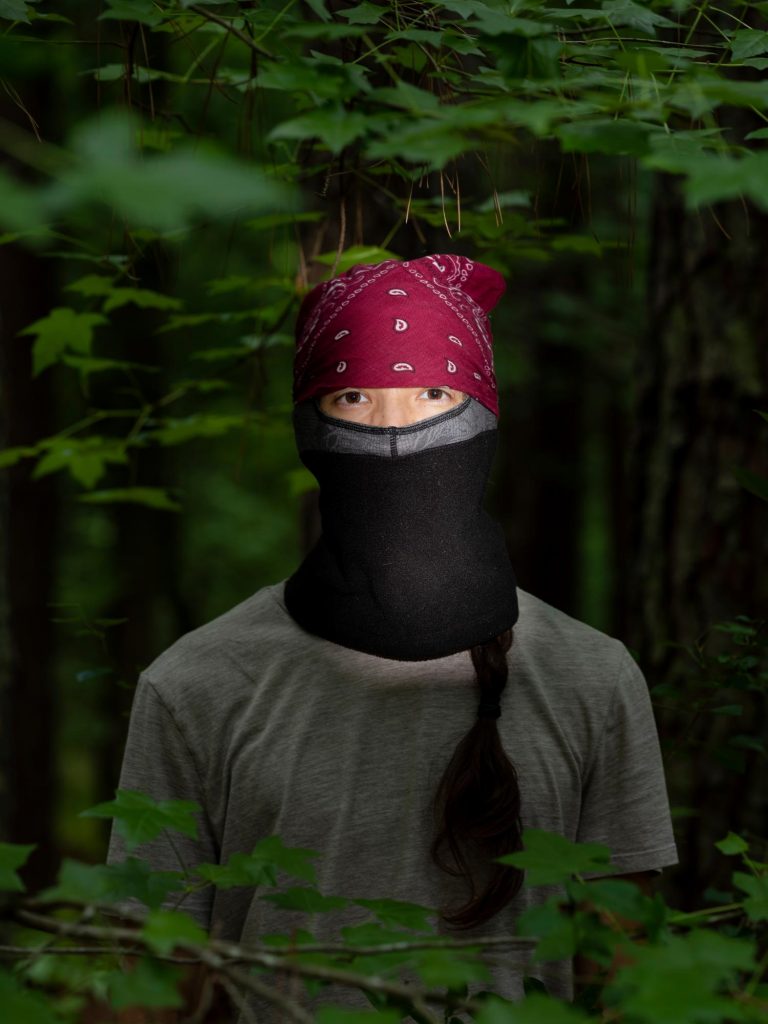
The sign in the forest reads “You are now leaving The U.S.A.” Then, high up among the branches of a white oak tree, there is a treehouse the size of a closet. It is draped on all sides with white sheets bearing painted messages like “No police”, “No pipelines” and “No prisons”.
On the ground below it, forest paths have been blocked with makeshift barricades of branches and used tires. There is a burned-out white pickup truck with “Defend the forest” spray-painted in black on its tailgate.
The city of Atlanta wants to build a $90m training center for police and firefighters in this suburban patch of forest. In response activists have taken to the trees to protest what they dismiss as a “Cop City”, a plan that was approved amid local opposition.
Clashes have sometimes turned violent. The city says protesters are trespassing on private land. Several protesters were arrested in a raid in mid-May after throwing molotov cocktails at officers patrolling the land.
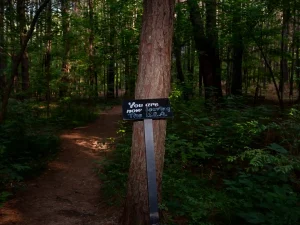
A sign installed by anonymous Atlanta Forest Defenders in forested land near Atlanta
The Atlanta Police Foundation, which is helping fund the project in an unincorporated part of DeKalb county, says on its website that it will have “the necessary facilities required to effectively train 21st-century law enforcement agencies responsible for public safety in a major urban city.”
Among the training features will be a burn tower for firefighters to practice extinguishing life-threatening blazes; areas for high-speed vehicle chases; a helicopter landing pad; a mock village including residential, school, nightlife and community areas, with structures such as a bank and a gas station; and a shooting range.
Neither the foundation, the police department nor the mayor’s office responded to requests for comment.
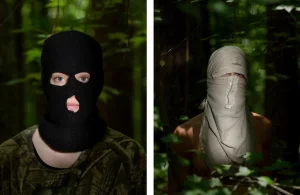
Anonymous Atlanta Forest Defenders.
“They’re going to call us like eco terrorists, and all kinds of stuff like that,” said an activist who gave the name Red, and who led a reporter on a tour of the area recently. “A lot of people out here had friends who’ve died, been imprisoned, been shot, and experienced a lot of trauma, so they have a really internalized hatred of police. There are other people who are very aware of the fact that the police are human beings who are trying to do what they think is right.”
Deeper into the area is a clearing where several junked cars and propped-up door frames are arranged among thick kudzu, most of them spray-painted with anarchist graffiti and expletive-laced anti-police slogans. Most notable is a yellow school bus, which is riddled with bullet holes in its windows and side paneling. Locals and activists believe that police use it for target practice, though police have not confirmed this.
The group that Red represents, Defend the Atlanta Forest, as well as other Atlanta residents who oppose the training ground’s construction, are concerned about the environmental and social impacts of the project.
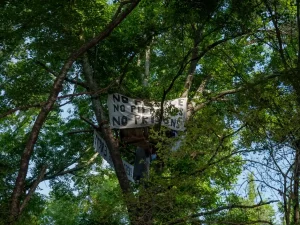
The activists’ treehouse. Photograph: David Walter Banks/The Guardian
The area has been critical in preventing stormwater flooding. Efforts are being made by environmentalists, community organizations and other advocates to create a conservation area here called the South River Forest, which would be the city’s largest protected green space.
In addition to air quality concerns from fires and weapons training, there is a historical legacy of disinvestment in this mainly Black section of metro Atlanta, and a history of cruel treatment of those incarcerated at a prison agricultural facility located in the forest, which closed in 1995.
Some neighborhoods here are 75% Black or higher, according to the US census, and they have high rates of poverty and health challenges, such as diabetes and asthma.
The development has become more controversial since it was approved by the Atlanta city council in September 2021. Some Atlantans have complained that the development process has not been transparent enough, and that public opinion has been disregarded. Just before the September vote, the council received 17 hours of recorded public comment, with an overwhelming 70% of residents expressing their opposition. Still, it passed in a 10-4 vote.
The local chapter of the Sierra Club, which urged the Atlanta city council to vote against the project, remains opposed.
“We’re certainly disappointed that the city continues to move forward with this project despite the overwhelming public opposition,” said Nina Dutton, chair of the club’s Metro Atlanta Group, in an email. “The environmental ramifications of clearcutting a wide swath of one of the last remaining undeveloped forests in our city and replacing it with this facility would be significant and long-lasting.
“If built, the APF’s facility would constitute a huge investment into a system of policing and militarization that has already proven to be dangerous in this city and around the world, in forms ranging from racial disparities in deadly interactions with police, to pollution from explosives and gun ranges persisting in the environment.”
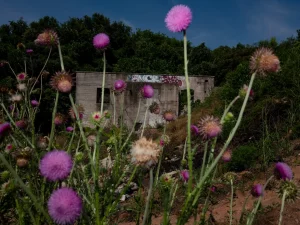
Ruins of the Atlanta prison farm.
Kendra Kelly, a retired army reserve and air force veteran, has lived in the area for six years. She says she hears gunfire and explosions almost daily, from morning to night, which she says are jarring, and she worries that development will disrupt the ecology of the area.
“It almost makes it seem like the needs of those in the community aren’t important or considered at all. It seems like it’s just a matter of convenience – the easiest, simplest accomplishment, more than consideration of the area, and how Black folks are impacted.”
Adding to concerns are plans for an Atlanta-based film studio, Blackhall Studios, which produced the television series Lovecraft Country, to expand into Intrenchment Creek park. It has acquired 40 acres as part of a controversial land swap with the county.
By the rusted gate barring the entrance of a prison farm building, Red lights a cigarette.
“We don’t want to live in a police state. We don’t want to live in a world that’s ravaged by climate change. And, you know, we just want to protect the nature that exists. And for me as an individual, this whole thing is coming from a place of love, not from rage or anger.”
